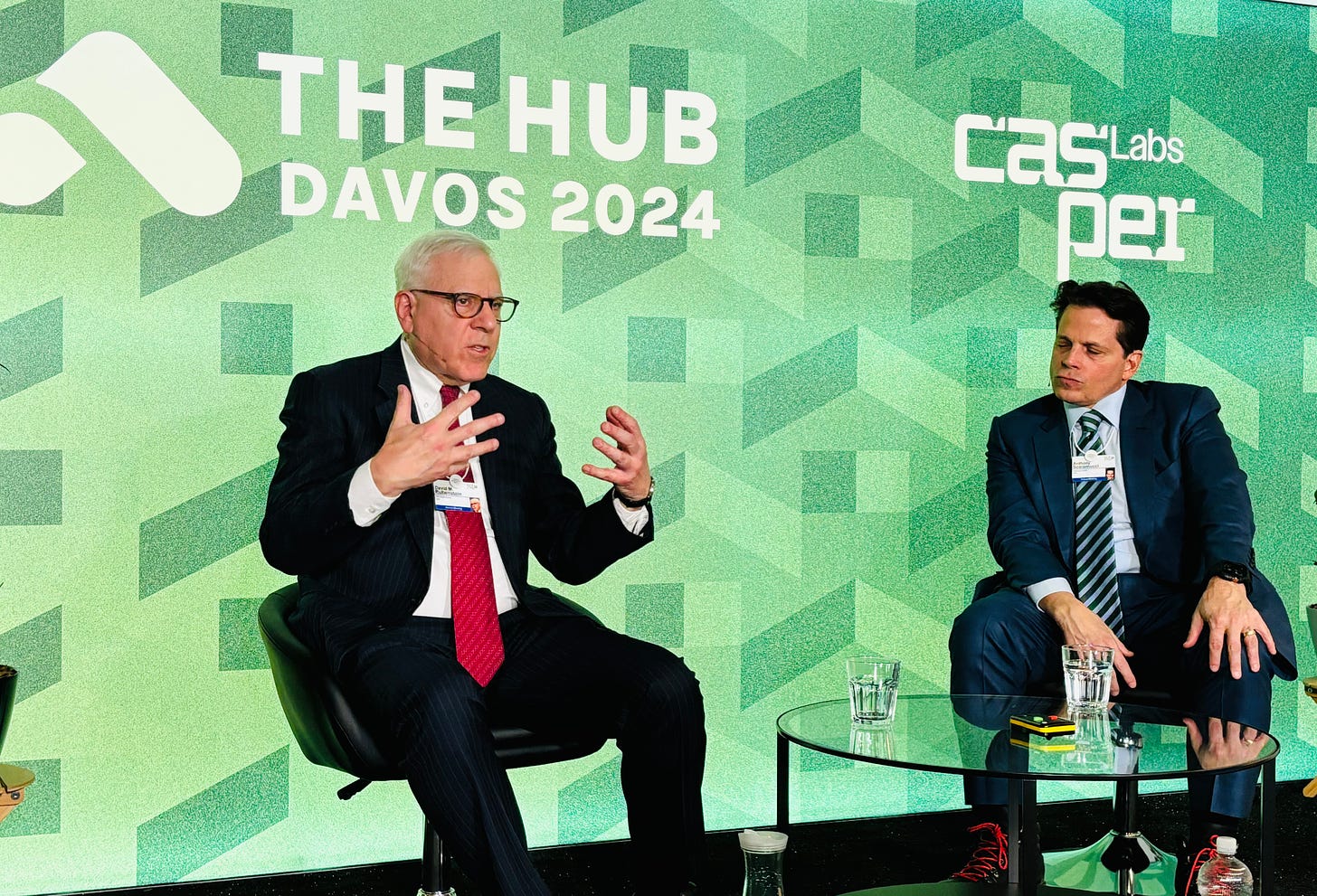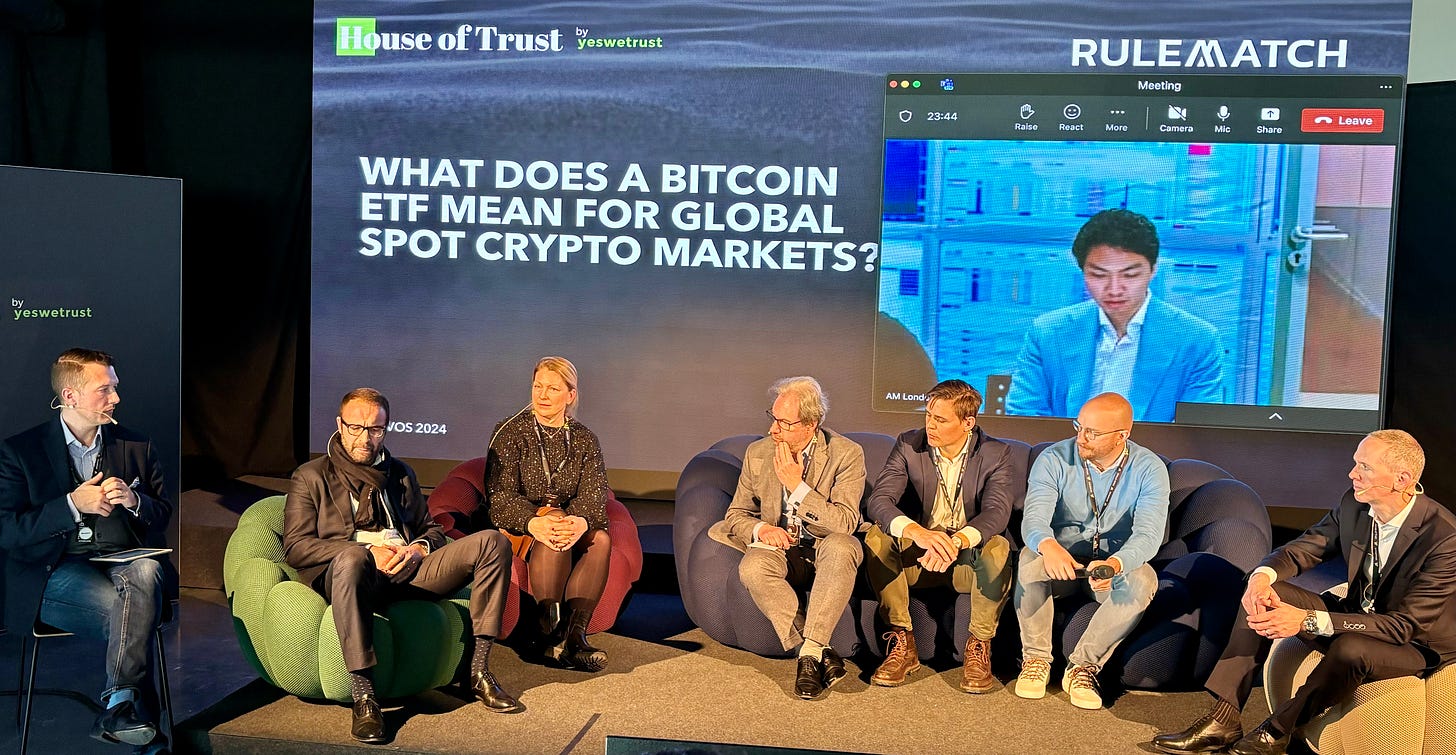NOTES FROM THE WEF IN DAVOS (2024)
This was my 3rd year attending the many events during the World Economic Forum in Davos. Here are my quick take-aways from the countless meetings I had.
GLOBAL BLOCKCHAIN BUSINESS COUNCIL PANEL ON DIGITAL ASSETS
Panelists: Ronald Kogens (MME Law), Tanvi Singh (UBS), Prof. Claudio Tessone (Uni Zurich Blockchain Center) and Stephanie Wickihalder (Swiss Fintech Innovations Association)
KEY TAKE-AWAYS
2024 is all about making money and ROI: “show me a business model that works and I will invest!” as years of heavy investing have to finally pay off.
Digital asset / crypto custody have security and usability challenges as crypto wallets are not user-friendly
The wider adoption of digital assets is at least 5 years out
There are more good actors required in the ecosystem after incidents such as FTX have turned the public opinion against crypto.
Cross-border / finance incurs massive compliance costs for actors in the final sector. This will slow-down progress and require heavy investments.
DAVID RUBENSTEIN (CARLYLE GROUP CO-FOUNDER) AND ANTHONY SCARAMUCCI (SKYBRIDGE) PANEL
Insights from David as a co-founder and media host (TV and podcast):
Making people look funny in interviews makes you a great moderator
Observations from meeting with Sam Bankman-Fried: he was shaking his legs and looked like a genius – Rubenstein never invested in FTX (Scaramucci did and lost money)
Leadership insights: be persistent, humble and communicate. Geniuses are not great as they are hard to manage. Being reasonably intelligent helps.
Crypto is attractive as people like money that is not controlled by government and not taxed
Crypto: Standstill in US crypto regulation
David does not own Bitcoin but invested in companies in the Web3 space (picks and shovels)
Tipp: I can highly recommend his latest book interviewing American investment icons!
PROFESSOR ALEKSANDAR BERENTSEN UNIVERSITY OF BASEL
Alex is a long-term believer in financial innovation through blockchain. He is himself very actively engaged in the DeFi and Web3 space and is heavily invested in crypto and DeFi.
Crypto and DeFi are a radical new innovation: the first time in finance that the ownership and control of a financial asset is combined (no middleman). It is DIY finance: be your own banker!
It is too early to regulate DeFi and kill a blooming sector. Regulations hamper innovation! We are just at the very beginning of DeFi with a large community such as in Ethereum working on new models and conceptsWe do not fully understand the technology yet. Give it some space. Let innovation happen! Let people take calculated risks.
The FTX failure was not about crypto but about traditional / centralized finance and fraud. It does not mean that crypto is bad! For example, in the case of the collapse of Credit Suisse no one asked for the banning of fiat money!
In DeFi who is responsible or liable has not been decided yet. This is unclear at the moment.
Different nationalities think differently about values including regulation - a lot of diversity without a consensus. This will hamper a global regulatory crypto framework!
Crypto offers a choice in finance. It offers innovation and freedom from a government overreach and shall not be overregulated!
RULEMATCH PANEL DISCUSSION ON SPOT TRADING VENUES AND BITCOIN ETF
Panelists: Ian Simpson (Rulematch), Michael Higgins (Hidden Road), Isabell Moessler (21Shares), Philippe Meyer (BBVA Bank), Jonas Gantenbein (Bank Frick), David Riegelnig (Rulematch) and Michael Jonas (Amina Bank)
Spot trading is still the weakest link but is required for market integrity (according to the SEC).
Traditional US financial players do not touch crypto but only do cash settlement.
ETFs open US market: will generate more liquidity and speed up conversion of crypto and TraFi.
Bank Frick focused on counterpart risks: leading crypto exchanges do not have a satisfactory risk profile – this is a fundamental problem for financial institutions.
In Switzerland and Europe Bitcoin ETPs have existed for 5 years. Due to regulatory reasons Europeans use ETPs while Americans use ETFs. Fundamentally, bitcoin ETPs and ETFs are very similar.
For financial product capital efficiency is important
Price wars will create non-vertically integrated/specialized exchanges in contrast to incumbents such as Binance that are fully integrated from custody, trading, lending to derivatives.
Spot ETFs will spur derivatives such as basket, leveraged products and similar: ETF are an access vehicle for the wider financial industry.
The investment thesis of Bitcoin is not clear yet: store of value, hard asset - in 2024 full expression of Bitcoin expected.
FIRESIDE CHAT WITH MICHAEL SONNENSHEIN CEO GRAYSCALE
Grayscale is a US asset manager that also launched a bitcoin ETF (of a total of 11). Here are his remarks:
ETFs are a legitimization of crypto as an asset class.
Grayscale sued the SEC in regards to a bitcoin ETF and won. This triggered the SEC’s sign-off of the bitcoin ETFs. This was a landmark lawsuit for the entire crypto industry. The SEC is taking legal losses from Ripple to Grayscale and maybe the pending Coinbase lawsuit.
The announced Circle (US stablecoin) IPO will create more legitimacy for the crypto industry.
Custody for the ETF is at Coinbase.
Bitcoin means different things to different investors.
ETF will not replace Bitcoin direct holdings but expands it as it has done for gold ETFs. ETFs serve a wider institutional client base while direct crypto accounts are for traders.
ALEXANDER CHRISTEN FIVET FINTECH VENTURES
Alexander is the founder of the Swiss crypto VC FiveT Fintech based in Zurich. He is currently raising his 2nd fund. His first fund of 11 investments had already 4 exits and 65% of the money already has been returned to investors. Here are his insights:
The current fundraising environment for VC funds is challenging and in crypto even more so
Many crypto funds are struggling with the lack of exits of their investments
There are many copy-cat crypto startups vying for investor money (e.g. tokenization of gold) and he stays away from them.
His investment thesis is to invest in crypto SaaS companies that enable the emergence of the new digital asset infrastructure (he invested into Rulematch).
WILL.I.AM PANEL ON AI
Will.I.Am is a musician and a member of the US group Black Eyed Peas. He was interviewed by Gillian Tett of the Financial Times on the advancement of AI:
The music industry has experienced multiple times a disruption due to technology (think CDs or streaming)
He has been involved in AI since 2016
He feels that AI will not be able to entirely replace him but will let him help to creatively express himself better
He highlighted the challenges surrounding AI and copyright
Overall, he feels there is too much hype about AI and everyone shall calm down!
Best quote at the WEF
Please stop talking about this shit (bitcoin)! (Jamie Dimon, CEO of JPMorgan on CNBC)








